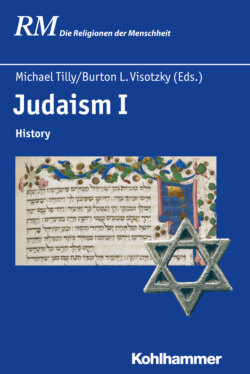Читать книгу Judaism I - Группа авторов - Страница 56
На сайте Литреса книга снята с продажи.
4.4 Reception of the martyrdom of the mother and her seven sons Ancient Judaism
ОглавлениеFourth Maccabees, which came into being around two centuries after 2 Maccabees, takes up the martyrdoms of 2 Macc 6:18–7:41 but places them in a new context, namely the philosophical context that »devout reason (eusebes logismos) is absolute master of the passions« (4 Macc 1:1). In the historical examples for this thesis, Eleazar and the seven brothers and their mother are mentioned (2 Macc 6:18–7:41): »Taking no account at all of the sufferings that brought them to their death, they all proved that reason is lord of the passions« (4 Macc. 1:9). In contrast with the historical-theological concept of the martyrdoms of 2 Macc 7:38, 4 Maccabees develops an atonement-theological one, which comes to expression in Eleazar’s last words: »Make my blood (haima) their purification (katharsion) and take my life (psychen) as a ransom for theirs (lit. ›for them‹)« (4 Macc. 6:29). In their death, the seven sons and their mother became »as it were, a ransom (antipsychon) for the sin of our nation. Through the blood of these righteous ones and through the propitiation of their death the divine providence rescued Israel« (17:21–22).
Although it is true that the books of the Maccabees were handed down exclusively in the Christian churches and the Maccabean martyrs were venerated as precursors of the Christian martyrs, the rabbinic tradition also guarded their memory, erroneously dating it to the time of Hadrian, more precisely to the time of the Second Jewish Revolt. The version in b. Git. 57b reads:
»Because of you we are being killed all day long and accounted as sheep for the slaughter« (Ps 44:23). R. Judah says: »This refers to the woman and her seven sons. They brought the first before the Emperor and said to him: Serve the idol. He said to them: It is written in the Law: ›I am the Lord thy God‹ (Ex 20:2). So, they led him away and killed him. They then brought the second before the Emperor and said to him: Serve the idol. He said to them: It is written in the Law: ›Thou shalt have no other gods before me‹ (Ex 20:3). So, they led him away and killed him.
It continues, each time a call to worship the idol being followed by a text from Scripture with the confession of the oneness of God. On being required to worship the idol, the last of the brothers quotes Deut 26:17–18:
»Thou hast avouched the Lord this day ... and the Lord hath avouched thee this day.« We have long ago sworn to the Holy One, blessed by He, that we will not exchange Him for any other god, and He also has sworn to us that He will not change us for any other people. The Emperor then said to him: I will throw down my seal before you and you can stoop down and pick it up, so that they will say of you that you have conformed to the desire of the king. He replied: ›Fie on thee, Caesar, fie on thee, Caesar; if thine own honour is so important, how much more the honour of the Holy One, blessed be He!‹ They were leading him away to kill him when his mother said: ›Give him to me that I may kiss him a little.‹ She said to him: ›My son, go and say to your Father Abraham: Thou didst bind one [son to the] altar, but I have bound seven altars.‹ Then she also went up on to a roof and threw herself down and was killed. A voice thereupon came forth from heaven saying, ›A joyful mother of children.‹ (Ps 113:9).62
The dating of the narrative is close to the time of composition of 4 Maccabees and should be regarded as an updating of the old tradition during the Hadrianic persecution. The heavenly voice proclaims the justification of the martyrs who died for the sake of the oneness of God.63
